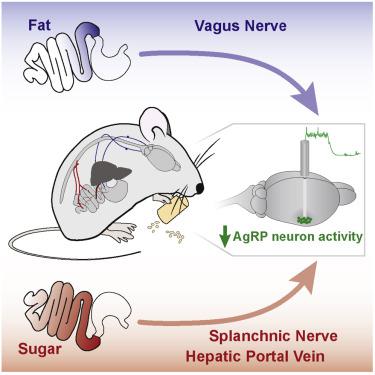Cell Metabolism ( IF 27.7 ) Pub Date : 2021-01-14 , DOI: 10.1016/j.cmet.2020.12.018 Nitsan Goldstein 1 , Aaron D McKnight 2 , Jamie R E Carty 1 , Myrtha Arnold 3 , J Nicholas Betley 1 , Amber L Alhadeff 2

|
Food intake is tightly regulated by complex and coordinated gut-brain interactions. Nutrients rapidly modulate activity in key populations of hypothalamic neurons that regulate food intake, including hunger-sensitive agouti-related protein (AgRP)-expressing neurons. Because individual macronutrients engage specific receptors in the gut to communicate with the brain, we reasoned that macronutrients may utilize different pathways to reduce activity in AgRP neurons. Here, we revealed that AgRP neuron activity in hungry mice is inhibited by site-specific intestinal detection of different macronutrients. We showed that vagal gut-brain signaling is required for AgRP neuron inhibition by fat. In contrast, spinal gut-brain signaling relays the presence of intestinal glucose. Further, we identified glucose sensors in the intestine and hepatic portal vein that mediate glucose-dependent AgRP neuron inhibition. Therefore, distinct pathways are activated by individual macronutrients to inhibit AgRP neuron activity.
中文翻译:

下丘脑通过多种肠脑通路检测大量营养素
食物摄入受到复杂和协调的肠脑相互作用的严格控制。营养素可快速调节调节食物摄入的关键下丘脑神经元群的活动,包括表达饥饿敏感的刺鼠相关蛋白 (AgRP) 的神经元。由于个别宏量营养素与肠道中的特定受体结合以与大脑交流,我们推断宏量营养素可能利用不同的途径来降低 AgRP 神经元的活性。在这里,我们发现饥饿小鼠中的 AgRP 神经元活性受到不同常量营养素的位点特异性肠道检测的抑制。我们发现迷走神经的肠脑信号是脂肪抑制 AgRP 神经元所必需的。相比之下,脊髓肠-脑信号传递了肠道葡萄糖的存在。进一步,我们确定了肠道和肝门静脉中的葡萄糖传感器,它们介导葡萄糖依赖性 AgRP 神经元抑制。因此,不同的途径被单个宏量营养素激活以抑制 AgRP 神经元的活性。











































 京公网安备 11010802027423号
京公网安备 11010802027423号